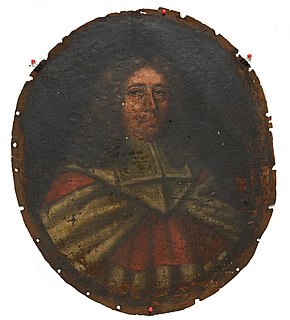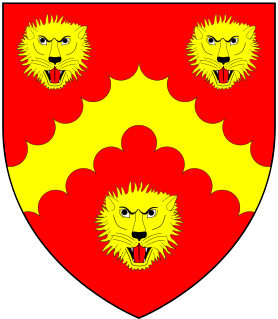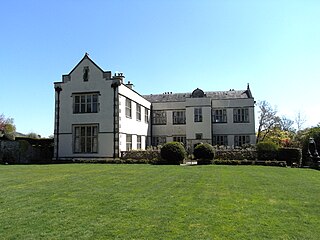Devon was a parliamentary constituency covering the county of Devon in England. It was represented by two Knights of the Shire, in the House of Commons of England until 1707, then of the House of Commons of Great Britain from 1707 to 1800 and finally the House of Commons of the United Kingdom from 1801 to 1832. Elections were held using the bloc vote system of elections.
Sir Richard Reynell, of Pitney in the county of Somerset, Sheriff of Devon in 1191-4, was a knight who lived during the successive reigns of Kings Henry II (1154-1189), Richard I (1189-1199) and John (1199-1216).

Richard Reynell (1519–1585) of East Ogwell, Devon, was an English Member of Parliament. An account of him and his sons is given by John Prince in his Worthies of Devon.

Sir Richard Reynell (c.1558–1633) of Forde in the parish of Wolborough, Devon, was an English lawyer and Member of Parliament. He built the surviving Ford House, now in the suburbs of Newton Abbot and his daughter and sole heiress Jane Reynell, married the Parliamentary general Sir William Waller.

The Reynell Baronetcy, of Laleham in the County of Middlesex, was a title in the Baronetage of Ireland. It was created on 27 July 1678 for Richard Reynell, subsequently Member of Parliament for Ashburton in Devon, and Lord Chief Justice of the King's Bench in Ireland 1691–1695. The 2nd Baronet represented Wicklow Borough in the Irish House of Commons. The 6th Baronet was a distinguished soldier who fought at the Battle of Waterloo. The title became extinct on his death in 1848. They were a junior branch of the ancient Reynell family of East Ogwell and West Ogwell in Devon.

Sir Edmund Fowell, 1st Baronet of Fowelscombe in the parish of Ugborough in Devon, was a Member of Parliament for Ashburton in Devon from 1640 to 1648.

Sir Richard Reynell, 1st Baronet ,was an English-born judge who had a distinguished career in Ireland and held office as Lord Chief Justice of the King's Bench in Ireland. He was the first of the Reynell baronets of Laleham.

Thomas Reynell of East Ogwell, Devon, was an English lawyer and politician who sat in the House of Commons at various times between 1654 and 1689.

Sir Carew Reynell was an English courtier, soldier and politician who sat in the House of Commons at various times between 1593 and 1622.

Sir Thomas Reynell was an English politician who sat in the House of Commons from 1624 to 1629.

Sir Richard Reynell, 2nd Baronet (1673–1723) was an Anglo-Irish politician and landowner who sat in the Irish House of Commons as member for Wicklow from 1692 to 1693.

Sir Edmund Prideaux, 1st Baronet (1554–1628), of Netherton in the parish of Farway, Devon, was a Councellor at Law and Double Reader of the Inner Temple and was created a baronet on 17 July 1622. He purchased the estate of Netherton where in 1607 he built a new mansion house, known today as Netherton Hall, a grade II listed building. He was one of John Prince's Worthies of Devon.

John Peryam, of Exeter, Devon, was elected four times as a Member of Parliament, for Barnstaple 1584, Bossiney 1586, Exeter 1589 and 1593. He served as Mayor of Exeter. He was the younger brother of Sir William Peryam (1534-1604) of Little Fulford, near Crediton in Devon, Lord Chief Baron of the Exchequer.

Creedy is an historic estate in the parish of Sandford, near Crediton in Devon. It is named from its location on the west side of the River Creedy. It was the seat of the Davie family from about 1600 until the late 20th century. The mansion house on the estate has been called at various times New House, Creedy House, and as presently, Creedy Park. It was first built in about 1600, rebuilt in 1846, burnt down in 1915 and rebuilt 1916–21. It is surrounded by a large park, the boundary of which is enclosed by a stone and brick wall several miles long.

Netherton in the parish of Farway in Devon is an historic estate situated about 3 1/2 miles south-east of Honiton. The present mansion house known as Netherton Hall was built in 1607 in the Jacobean style, restored and rebuilt 1836-44, and is a Grade II listed building.

West Ogwell is a village and former civil parish and manor in Devon, England, located 2 miles south-west of the town of Newton Abbot and 1 mile west of the village of East Ogwell. It is now in the civil parish of Ogwell, administered by Teignbridge District Council. The church and manor house "lie hidden away on their own".

Walter Reynell was a Member of Parliament for Devon in 1404.

Walter Reynell of Malston in the parish of Sherford, Devon, was a Member of Parliament for Devon in 1454/55.

John Reynell was a Member of Parliament for Devon in 1427/28.

Hugues de Revel was the twentieth Grand Master of the Knights Hospitaller, serving first from 1258–1277 as the successor to Guillaume de Chateauneuf. He was succeeded by Nicolas Lorgne.









